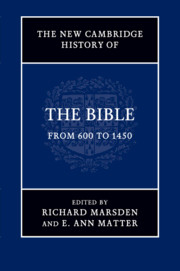Book contents
- Frontmatter
- Contents
- Figures
- Contributors
- Preface
- Abbreviations
- Abbreviations of books of the Bible
- Table of Psalm numbering
- Introduction
- Part I Texts and Versions
- Part II Format and Transmission
- Part III The Bible Interpreted
- Part IV The Bible in Use
- Part V The Bible Transformed
- 40 The Bible in public art, 600–1050
- 41 The Bible in public art, 1050–1450
- 42 Icons of the eastern church
- 43 Medieval verse paraphrases of the Bible
- 44 Staging the Bible
- Bibliography
- Index of biblical manuscripts
- Index of scriptural sources
- General index
- References
43 - Medieval verse paraphrases of the Bible
from Part V - The Bible Transformed
Published online by Cambridge University Press: 28 May 2012
- Frontmatter
- Contents
- Figures
- Contributors
- Preface
- Abbreviations
- Abbreviations of books of the Bible
- Table of Psalm numbering
- Introduction
- Part I Texts and Versions
- Part II Format and Transmission
- Part III The Bible Interpreted
- Part IV The Bible in Use
- Part V The Bible Transformed
- 40 The Bible in public art, 600–1050
- 41 The Bible in public art, 1050–1450
- 42 Icons of the eastern church
- 43 Medieval verse paraphrases of the Bible
- 44 Staging the Bible
- Bibliography
- Index of biblical manuscripts
- Index of scriptural sources
- General index
- References
Summary
Biblical paraphrases in verse survive in most medieval European vernaculars, though sometimes in fragmentary form. They are often short; most commonly they are of single books or extracts from those books, though they may make allusions to the larger themes of the Bible. The following pages focus on general trends and highlight a few important verse paraphrases dating from the seventh to the fifteenth centuries, composed in forms of English, French and German. These three languages were particularly influential in the Middle Ages, exporting literary trends to other parts of Europe. But the languages and the texts described are in any case intended to be exemplary, to suggest something of the shape and nature of vernacular verse paraphrase of the Bible in the Middle Ages.
In the Old Testament, the books most often paraphrased by poets were Genesis, Judith, Psalms, Song of Songs, Daniel and Maccabees. In the New Testament, Christ's life, miracles and passion – especially the latter – were often retold in verse, and were typically derived from a gospel ‘harmony’, or even from the poet's memory, rather than being directly translated from a specific gospel. The Apocalypse received considerable attention too, often with commentary and in profusely illustrated manuscripts. In general, poets and translators were drawn to books or parts of books that told dramatic stories, but in the case of the psalms, which were central to liturgical and sacramental life, the imperative was devotional. Little attention was paid to the Old Testament prophets, with the exception of prophecies about Christ, which were often integrated into translations or paraphrases of the New Testament. The Pauline and Catholic Epistles attracted no direct verse translations, though they did inspire some versified homilies; scenes from Acts, such as the Martyrdom of Stephen and the Conversion of Paul, occur in hagiographical drama.
- Type
- Chapter
- Information
- The New Cambridge History of the Bible , pp. 835 - 859Publisher: Cambridge University PressPrint publication year: 2012
References
- 1
- Cited by

